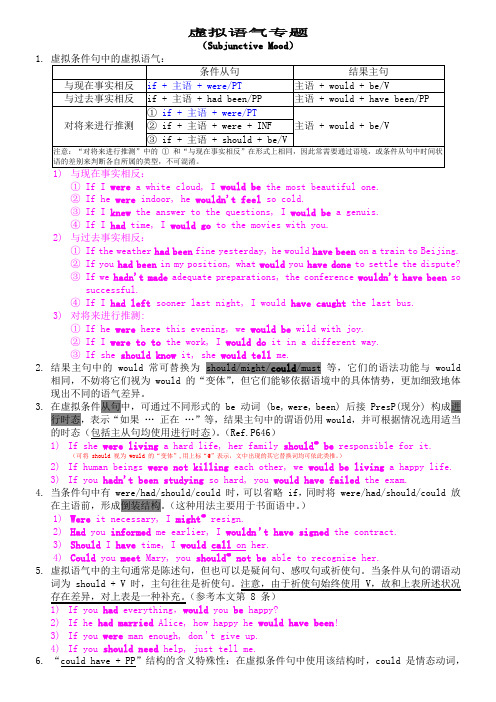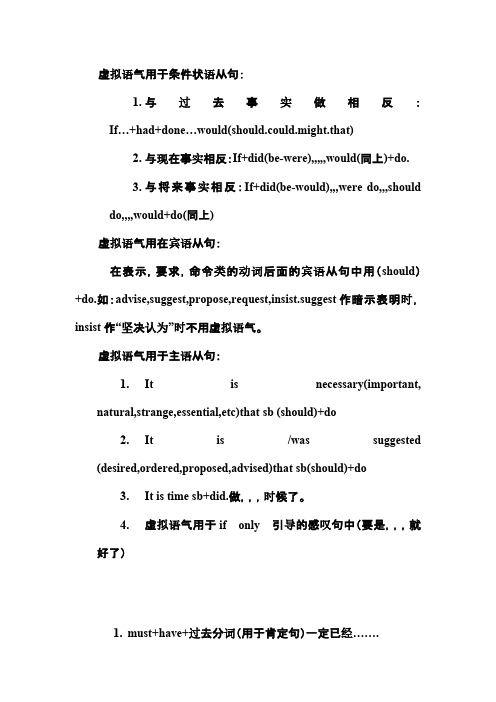IF ONLY 和 WOULD THAT 后用虚拟语气
- 格式:doc
- 大小:15.00 KB
- 文档页数:3


英语语法虚拟语气的知识点归纳一、虚拟条件句(一)含有if条件句的主从句的虚拟语气总结:1. If 条件句中谓语动词的虚拟结构是在原来陈述语气所用时态的基础上倒退一个时态(对将来虚拟的were to do/should do例外)2. 主句要借助于情态动词的过去式,后跟动词原形(现在或将来)或have done(过去);if条件句中只出现一个情态动词,即对将来虚拟的should.3.做此类题目时一定要分清是从句还是主句谓语动词的虚拟,还要把握好时态。
注意:1. 在虚拟条件从句中,动词“be”的过去时态一律用”were”,不用was。
2. 在虚拟条件状语中如果有were, should, had这三个词中任何一个,可省略if,把这三个词提到主语之前, 变成:were/should/had +主语+剩余成分。
3.在虚拟条件状语从句中,省略连词的倒装形式的句首不能用动词的缩略形式。
如我们可说Were I not to do., 而不能说Weren‘t I to do。
4.在表示与将来事实相反的条件句中,只能用should,而不能用would,could和might 等。
5.主句中的should通常用于第一人称,would,could以及might 可以用于各种人称eg :①If I were a bird, I could fly in the air.如果我是一只小鸟,我就能在空中飞行。
②I wish I could pass the examination.我希望我能通过考试。
在虚拟条件句中,对于与将来事实相反的情形,请注意以下几点:(1)条件从句表示的内容与将来事实相反,实为对将来情况的推测,用过去时表示虚拟;(2)条件从句谓语除用过去式外,有时也用“should+动词原形(表示可能性极小,常译为“万一”)”或“were to+动词原形(表示与将来事实相反的假设)”;(3)条件从句使用“should+动词原形”这样的谓语形式时,主句谓语除可用“should (would, could, might)+动词原形”这样的虚拟语气形式外,也可用直陈语气或祈使语气。


虚拟语气专题(Subjunctive Mood)1.①If I were a white cloud, I would be the most beautiful one.②If he were indoor, he wouldn't feel so cold.③If I knew the answer to the questions, I would be a genuis.④If I had time, I would go to the movies with you.2)与过去事实相反:①If the weather had been fine yesterday, he would have been on a train to Beijing.②If you had been in my position, what would you have done to settle the dispute?③If we hadn't made adequate preparations, the conference wouldn't have been sosuccessful.④If I had left sooner last night, I would have caught the last bus.3)对将来进行推测:①If he were here this evening, we would be wild with joy.②If I were to to the work, I would do it in a different way.③If she should know it, she would tell me.2.结果主句中的 would 常可替换为 should/might/could/must 等,它们的语法功能与 would相同,不妨将它们视为 would 的“变体”,但它们能够依据语境中的具体情势,更加细致地体现出不同的语气差异。

虚拟语气全归纳四大类别If虚拟条件句Wish/if only/would rather愿望和as if(though)好像从句中should+动词原形,should可省略It’s time从句第一类 If虚拟条件句分三种时态:与现在事实相反、与过去事实相反、与将来事实相反。
*条件句有真实条件句和非真实(虚拟)条件句两种。
真实条件句的假设是有可能发生的,而非真实条件句的假想与事实相反或不大可能会发生,试比较:If I have time, I will go with them. 假若我有时间,我就同他们去。
(陈述语气)If I were you, I would go with them. 假若我是你,我就同他们去。
(虚拟语气)If条件句虚拟时态类型主句If引导的从句例句与现在相反would/should/could/might+ V原动词过去式 did*be 多用were1. If I were you, I should study English.2. I would certainly go if I had time.与过去相反would/should/could/might + have done动词过去完成式had done1. If you had taken my advice, you would not have failed in the test.2. If I had left a little earlier, Iwould have caught the train.与将来相反would/should/could/might + V原①动词过去式②should +V原③were+ to do1.If you came tomorrow, we would havethe meeting. ①2. If it were to rain tomorrow, the meeting would be put off.③*规律总:从句都往过去推一个时态,如:与现在相反的if 从句就用过去时;与过去相反用过去完成时(即去的过去)注:几点特别说明1、l would/should/could/might 主句谓语中的should主要用于第一人称后;would表示结果,might表示可能性,could表示能力、允许或可能性。

虚拟语气用于条件状语从句:1.与过去事实做相反:If…+had+done…would(should.could.might.that)2.与现在事实相反:If+did(be-were),,,,,would(同上)+do.3.与将来事实相反:If+did(be-would),,,were do,,,shoulddo,,,,would+do(同上)虚拟语气用在宾语从句:在表示,要求,命令类的动词后面的宾语从句中用(should)+do.如:advise,suggest,propose,request,insist.suggest作暗示表明时,insist作“坚决认为”时不用虚拟语气。
虚拟语气用于主语从句:1.It is necessary(important,natural,strange,essential,etc)that sb (should)+do2.It is /was suggested(desired,ordered,proposed,advised)that sb(should)+do3.It is time sb+did.做,,,时候了。
4.虚拟语气用于if only 引导的感叹句中(要是,,,就好了)1.must+have+过去分词(用于肯定句)一定已经…….2.can’t (couldn’t)+have +过去分词(用于否定或疑问句)不可能….3.should/ought to+have+过去分词。
本来不应该(却做了)…4.needn’t+have+过去分词(本不必做)1.主谓一致是指:1)语法形式上要一致,即单复数形式与谓语要一致。
2)意义上要一致,即主语意义上的单复数要与谓语的单复数形式一致。
3)就近原则,即谓语动词的单复形式取决于最靠近它的词语,一般来说,不可数名词用动词单数,可数名词复数用动词复数。
例如:There is much water in the thermos.但当不可数名词前有表示数量的复数名词时,谓语动词用复数形式。
虚拟语气的几种常见句式1. wish后的宾语从句表示现在不能实现的愿望,从句的谓语用过去式;表示过去未能实现的愿望,从句的谓语用had + 过去分词;表示将来不太可能实现的愿望,从句的谓语用would + 动词原形。
如:I wish I knew the answer to the question.我真希望知道这个问题的答案。
(事实上不知道)I wish I had not wasted so much time.我真希望没有浪费这么多时间。
(事实是已经浪费了)I wish you would go with us tomorrow.但愿你明天跟我们一起去。
(你去的可能性不大)2. as if 或as though引导的表语从句和状语从句表示与现在事实相反,从句的谓语用过去式;表示与过去事实相反,用had +过去分词;表示与将来事实可能相反,用would + 动词原形。
如:She looks as if she were sick.她看起来像病了似的。
(其实没病)He looks as if nothing had happened to him.他看上去好像什么事都没发生似的。
(事实是出问题了)He talks about the book as if he had written it.他说起那本书来就好像是他写的。
(书不是他写的)如果as if / as though引导的从句所表述的内容与事实相符,应用陈述语气。
如:It looks as if our team is going to win.看来我们队要赢了。
(场上情况表明有可能)3. if only后的句子表示现在没有实现的愿望,动词用过去式;表示过去没有实现的愿望,动词用had+过去分词;表示与将来事实可能相反的假设,谓语动词使用would+动词原形,could+动词原形或虚拟语气过去时,常译为“要是……就好了”。
如:If only I could learn English well in one day.要是能在一天内把英语学好就好了。
3.“无法实现的愿望”——if only感叹句中的虚拟语气if only常常用来表达强烈的愿望或遗憾,主要用在虚拟语气中,用以表达强烈的愿望或非真实条件,意为“但愿”、“要是……该多好啊”,意思和wish相似, 用法和wish基本相同,可表示对现在,过去和将来的虚拟,只是比wish感情色彩更强烈一些。
本节课我们就一起来学习一下if only 感叹句中的虚拟语气。
一. 时态规则注意:if only 后的虚拟语气时态规则和wish的用法相同。
对现在的虚拟:If only I were taller. 我的个子要是能再高一点就好了。
If only I were better looking. 要是我长得漂亮些就好了。
对过去的虚拟:If only I had not married before I met you!要是遇见你之前,我没有结婚就好了。
If only she had had more courage!她再勇敢一些就好了。
对将来的虚拟:It has been raining for three days. If only the rain would stop.已经下了三天的雨了,要是雨能停就好了。
I felt sure that I could be a grownup if only my parents would get out of my way. 我肯定,只要父母不阻挠,我一定可以做个大人二. 解题方法1. 看到if only,想到需要使用虚拟语气;2. 根据句子中的时间状语或语境判断出虚拟的时间;3. 根据虚拟的时间,找出对应的时态;4. 牢记时态规则三. 经典例题1. Look at the terrible situation I am in! If only I_________your advice.A. followB. had followedC. would followD. have followed答案:B解析:看到if only 要想到后面需要使用虚拟语气。
If only 和would that 后用虚拟语气
谓语动词用一般过去时表示现在没有实现的愿望,用过去完成时表示过去没有实现的愿望,常译为“要是。
就好了”。
例如:
If only she had known where to find you.
If only I could speak several foreign languages!
Would that I were young again.
would that 实际上是I (we) would 的简化,I would 相当于I wish.例如:
I would I were a bird and could fly freely in the sky.
We would that we had seen through him earlier.
Note: 1) O that 和Would to God 是would that 的变体。
例如:O that money grew on the trees. 钱长在树上就好了。
Would to God she would return safely.但愿她平安归来。
2) O that 结构用虚拟语气可表示“惊讶,愤怒”。
例如:
O that she should have failed! 她竟然会失败!
3)should 可以表示惊讶,难以相信或不应该之事。
例如:
Why should he publish such a book? 他为何竟会出这种书?
Who should have broken the glass but himself? 不是他自己还有谁会把玻璃打碎呢?
Who are you that you should have despised the teacher? 你是何许人也,竟敢轻视教师?
What has captivated her mind that she should have said that?什么
使她迷了心窍,竟说出那种话来?
Note : 注意“It isn’t as if + 虚拟式句子”的译法
It isn’t as if he were poor. 他才不穷呢。
(他又不穷。
)
Why did you invite him to the symposium? It was not as if he were an expert ? 你为什么邀请他参加研讨会?他又不是什么专家!
It isn’t as if he had claimed to be the owner of the property. In fact he admitted that the property belonged to his uncle.他又没有声称自己拥有那些财产呀。
事实上,他承认那些财产属于他叔叔。
Whether it (he) be … or …结构
Whether it (he) be … or …意为“不管(不论)是。
还是。
”,表示让步,为虚拟语气的一种表示方法,其省略结构为be it … or … , be he … or …等,必须倒装。
例如:
Every day he takes a walk in the park in the evening, whether it be fine or raining.
Be they common people or high-ranking officials, they stand equal before the law.
She can translate all these books into Chinese, be they in English, French or Latin.
Note : be 用作虚拟式的其他说法还有:
Home is home, be it ever so homely. 再穷也是家。
He will do anything for her, be it to his death.为了她,他什么都会做,哪怕去死。
I shall tell you everything about it if need be. 如果需要的话,我将把有关的一切都告诉你。
Far be it from me to beg his mercy. 我绝不会乞求他的怜悯。